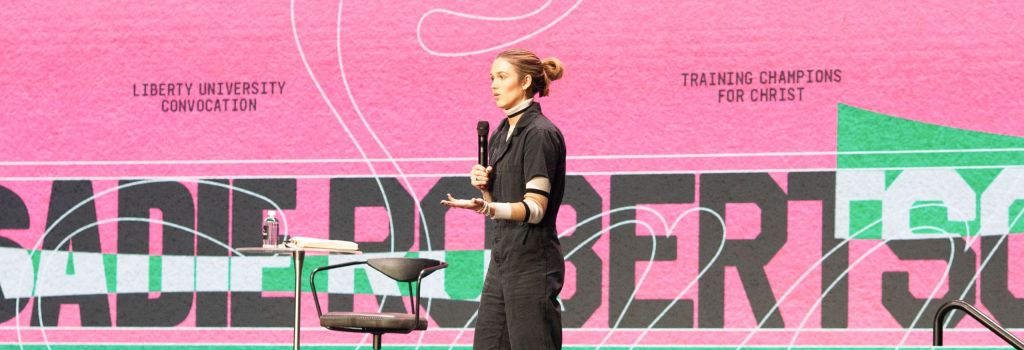This week’s Convocation speakers, Robert Madu and Sadie Robertson Huff, shared their respective messages that would equip the students on campus with truth.
Robert Madu, lead pastor of Social Dallas, spoke about the dangers of falling asleep spiritually in his message titled, “I Didn’t Know I Fell Asleep” on Wednesday, Jan. 31. Madu began by expressing how the scripture in Acts 20:7-12 sparked a memory from the first year of his marriage with his wife, Taylor Madu, as he was traveling and preaching. During an early morning Sunday service, Taylor fell asleep in the front row while her husband was preaching.
“All of us have had some sleepy moments in services where we’ve dozed off,” Madu said. “And if it (hasn’t) happened to you, I promise it will happen to you one day.”

Photo by Aziz Ibrahim
Madu joked that if someone hasn’t fallen asleep in church, it’s because they don’t go a lot. He related this to the story of Eutychus, a man who fell asleep while Paul was preaching and then fell out a window.
“The question I have been asking myself is, ‘Why did this story make the Bible?’” Madu said. “Of all the things that Luke could have written about, why do we need to know about this young dude named Eutychus who fell asleep in the middle of Paul’s preaching?”
Madu asked himself this question over and over again because he couldn’t understand why this scenario was in the Bible. However, there was one key factor that stood out in the passage. It only mentioned that Eutychus fell asleep — not everyone else — as Paul was preaching. Eventually, a key difference between the group and Eutychus was revealed.
“I’ll tell you what is often the difference,” Madu said. “It’s this thing called expectation. … I want you to start living your life with some expectation to have a God encounter.”
Sophomore Isabelle Candeleria appreciated Madu’s sense of humor, as well as how his mention of lamps showing the next step impacted her the most.
“That resonates a lot with me,” Candeleria said. “I don’t really know what I’m going to do with my life. But I’m trusting God with that next step and every single step I take.”

Photo by Aziz Ibrahim
Madu continued his message by revealing how his issue with Eutychus was not that he fell asleep, but where his seat was. Eutychus sat in an open window.
“My issue with Eutychus is not his sleep; it’s his seat,” Madu said. “He positioned himself in a dangerous place. He was seated in a window that was open.”
Madu pointed out that one knows there is an open window when seeing how close to the edge of a window one can go, having one foot in the church and the other looking outside searching for different options, and not leaning into everything that God has in store.
“We are living in a day and age where you have to be all the way in or all the way out,” Madu said. “There is no middle; there is no gray. You have to choose if you’re born to live a life that is set apart.”
Madu finished his message by affirming the most dangerous thing about sleep, which is not knowing when one has fallen asleep. He then shared several signs of spiritual sleepiness students should look out for in their lives.

Photo by Carlisle Jarnigan
Sadie Robertson Huff spoke to students about the importance of conviction during Friday’s convocation. Huff began by discussing how she was watching a TV series that did not align with biblical values but continued to watch it regardless.
“This is not a good show,” Huff said. “It doesn’t exactly align with our morals. I’m watching this show, and I started feeling convicted.”
Huff confessed her realization that she should not have been watching the series; however, she was so invested in it that she ignored her conviction. As a result, she also excused her actions in the process.
“What I started to do is think of all the good reasons as to why I’m watching this show,” Huff said. “It can get really dangerous when you get good at looking and sounding spiritual when you know the right thing to say, and you know how to make it look good. But in all reality, it’s in the wrong place.”
Huff made it clear to the campus that compromises are no laughing matter, and that there are consequences that start small, and then steadily grow into dire issues.
“That’s really where I was at,” Huff said. “I had gotten good at knowing how to convince myself that something is good, and that is really dangerous. The Bible really shows us how dangerous that is, and it plays out in the story of Judas.”

Photo by Carlisle Jarnigan
Huff said that Judas is an example of how if one ignores a conviction, and continues to compromise, the trivial consequences will become grave ones. She explained that Judas, despite being one of the 12 disciples of Jesus, committed misdeeds that culminated in hefty repercussions.
“I was really convicted when she mentioned that it is dangerous to know how to look and act like a ‘good Christian,’” sophomore Gavin Knolle said.
Huff revealed that she preached about that particular message because of the severe aftermaths of compromising, but also because of the immense good news in Jesus.
“It might not seem like a big deal to you, but it is a detrimental deal to someone else,” Huff said. “And that is why you cannot compare your convictions to someone else, because they might not have the same calling as you.”
Huff also noted that if one knows something is wrong, yet continues to do so, that action is indeed a sin. “You are not called to be nothing,” Huff said. “You are not called to be ‘not that bad’; you are not called to be ‘eh, it’s not that bad’: You are called to be the light of the world.”
Eric Amaro-Millán is a news reporter for the Liberty Champion
